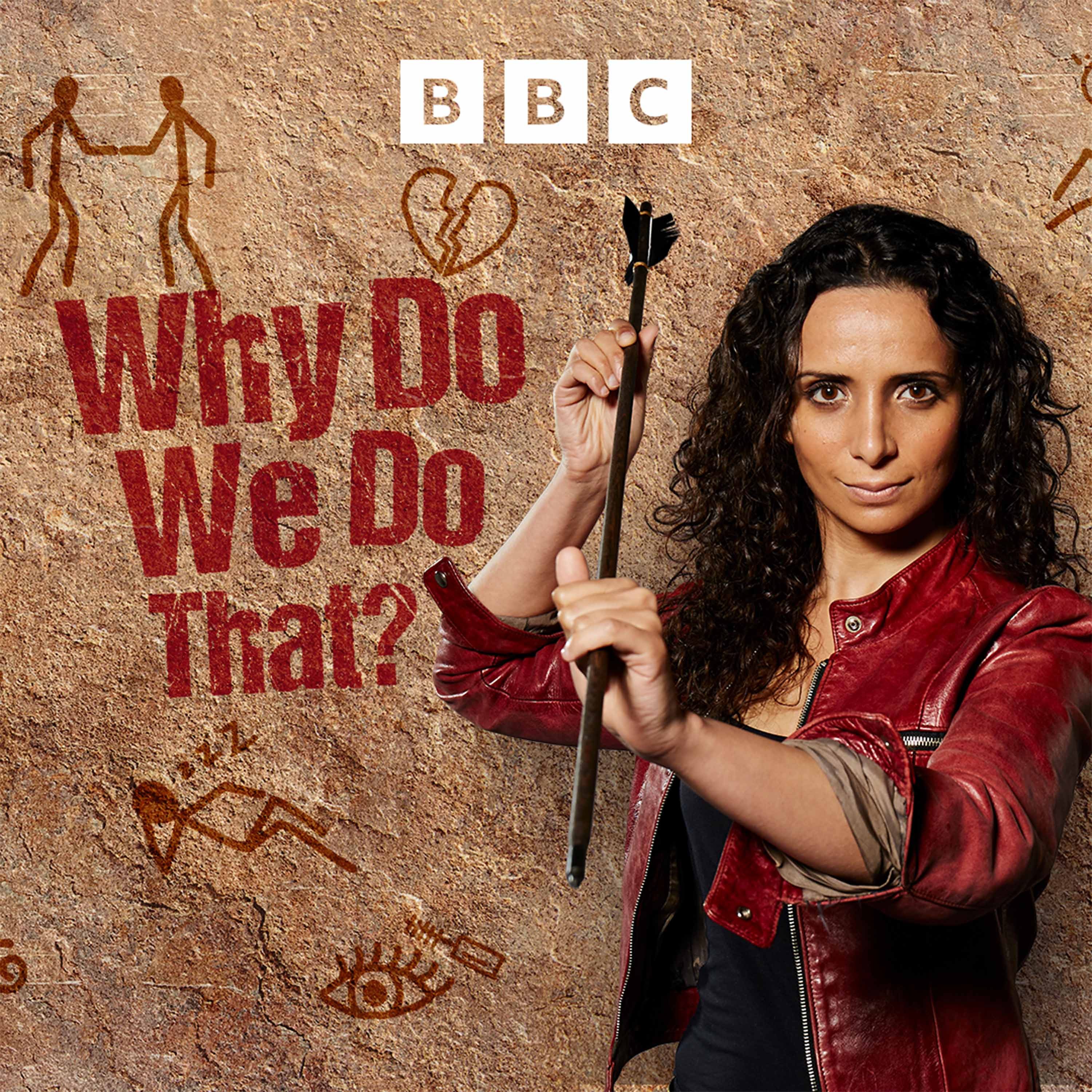

Why Do We Do That?
BBC Radio 4
Why Do We Do That? An anthropologist's guide to the modern world.There are lots of everyday things which, when you think about them, are pretty weird. Like kissing, doomscrolling and sitting down to go to the loo. Social media may tell you to blame the latest influencer who went viral. Your therapist might tell you to blame your parents. But palaeoanthropologist Ella Al-Shamahi is here to tell you to blame your great, great, great, great, great, etc. grandparents. For some stuff at least. In this series, Ella is joined by some wonderful guests to dive into the cultural, historical and evolutionary story of everyday human habits and behaviour.Photo: Sarah Cresswell / The Times / News Licensing
Episodes
Mentioned books

Apr 11, 2025 • 15min
More... Play with Brenna Hassett
Ella Al-Shamahi explores evolutionary mysteries in More Play with Brenna Hassett.BBC Studios Audio
Producer: Olivia Jani
Additional Production: Emily Bird
Series Producer: Geraldine Fitzgerald
Executive Producer: Alexandra Feachem

Apr 11, 2025 • 15min
12. Why do we play?
Paleoanthropologist Ella Al-Shamahi asks why do humans play?The Neanderthals are a species that was so close to us that we could reproduce with them, they had creativity, technology and they made art - handprints on cave walls and painted shells strung into necklaces. But it turns out the Neanderthals had shorter childhoods than us. Their children grew up quicker than their Homo sapiens counterparts. We don’t know why Neanderthals went extinct. It is probably for a few reasons but is it possible that us having these longer childhoods, having more time to play, might have given us a creative edge. There are probably more important reasons for our survival over them but it is food for thought. And we are still playing, anthropologist Brenna Hasset says play is part of learning how to be an adult so depending on where you grow up influences the type of games children play.BBC Studios Audio
Produced by Emily Bird
Additional production Olivia Jani and Ben Hughes
Series Producer Geraldine Fitzgerald
Executive Producer is Alexandra Feachem
Commissioning Editor is Rhian Roberts

Apr 9, 2025 • 17min
More... Bad Boys with Julia Stern
Ella Al-Shamahi explores evolutionary mysteries in More Bad Boys with Julia Stern.BBC Studios Audio
Producer: Olivia Jani
Additional Production: Emily Bird
Series Producer: Geraldine Fitzgerald
Executive Producer: Alexandra Feachem

Apr 9, 2025 • 15min
11. Why do we fall for the bad boy?
Paleoanthropologist Ella Al-Shamahi looks at the evidence for what people want in a partner and how it changes as they get older. Psychologist Julia Stern from the University of Bremen shares the results of a study which recruited people from a singles night in a Berlin club and followed them for 13 years. Novelist Adele Parks explains why writing about bad boys is so much fun, and on the Bridget Jones scale of bad boys think more Hugh Grant and less Colin Firth.

Apr 9, 2025 • 15min
More... Dancing with Bronwyn Tarr
Ella Al-Shamahi explores evolutionary mysteries in More Dancing with Bronwyn Tarr.BBC Studios Audio
Producer: Olivia Jani
Additional Production: Emily Bird
Series Producer: Geraldine Fitzgerald
Executive Producer: Alexandra Feachem

Apr 9, 2025 • 15min
10. Why do we dance?
Dance seems like such a natural thing, a good beat comes on and you can’t help it, you might find yourself bobbing, even the rhythmically impaired might find themselves tapping their fingers along to the music and it starts early - one study has shown that babies as young as 5 months engage in rhythmic movements.
Every culture on earth dances and yet look around at the rest of the animal kingdom… besides birds, can we say that other animals dance? Paleoanthropologist Ella Al-Shamahi asks why do we dance?

Apr 9, 2025 • 14min
More... Pubs with Robin Dunbar
Ella Al-Shamahi explores evolutionary mysteries in More Pubs with Robin Dunbar.BBC Studios Audio
Producer: Olivia Jani
Additional Production: Emily Bird
Series Producer: Geraldine Fitzgerald
Executive Producer: Alexandra Feachem

Apr 9, 2025 • 15min
9. Why do we go to the pub?
Humans have evolved to drink alcohol, or at least to be able to metabolise it. And we share this ability with our closest living relatives, the chimpanzees and gorillas, who are also able to convert alcohol into sugar.
It gave our ancestors an advantage because we could eat rotting fruit from the forest floor and convert the alcohol into sugars, providing a source of nutrients that not all species could digest. This is also known as the drunken monkey hypothesis. But paleoanthropologist Ella Al-Shamahi asks Professor Robin Dunbar if alcohol is why we go to the pub today.

Apr 9, 2025 • 16min
More... Nature with Gregory Bratman
Ella Al-Shamahi explores evolutionary mysteries in More Nature with Gregory Bratman.BBC Studios Audio
Producer: Olivia Jani
Additional Production: Emily Bird
Series Producer: Geraldine Fitzgerald
Executive Producer: Alexandra Feachem

Apr 9, 2025 • 15min
8. Why does nature make me feel calmer?
Explore how nature's beauty affects our mental well-being, delving into historical perspectives and anthropological insights. Discover the healing power of green spaces, especially in urban areas where nature is scarce. Learn about comprehensive studies that measure nature's calming effects on stress and cognitive function. The podcast also dives into the essential link between urban life and natural settings, offering insights on improving urban design for enhanced tranquility and wellness.


